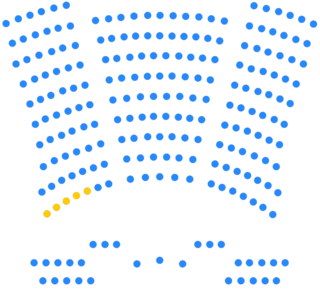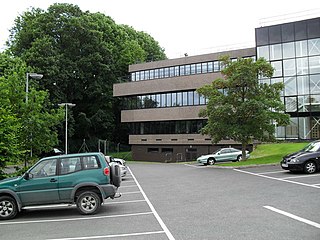
The politics of the United Kingdom functions within a constitutional monarchy where executive power is delegated by legislation and social conventions to a unitary parliamentary democracy. From this a hereditary monarch, currently Charles III, serves as head of state while the Prime Minister of the United Kingdom, currently Rishi Sunak since 2022, serves as the elected head of government.

The legislatures of the United Kingdom are derived from a number of different sources. The parliament of the United Kingdom is the supreme legislative body for the United Kingdom and the British overseas territories with Scotland, Wales and Northern Ireland each having their own devolved legislatures. Each of the three major jurisdictions of the United Kingdom has its own laws and legal system.

The Israeli system of government is based on parliamentary democracy. The Prime Minister of Israel is the head of government and leader of a multi-party system. Executive power is exercised by the government. Legislative power is vested in the Knesset. The Judiciary is independent of the executive and the legislature. The political system of the State of Israel and its main principles are set out in 11 Basic Laws. Israel does not have a written constitution.
The D'Hondt method, also called the Jefferson method or the greatest divisors method, is an apportionment method for allocating seats in parliaments among federal states, or in proportional representation among political parties. It belongs to the class of highest-averages methods.

The Northern Ireland Assembly, often referred to by the metonym Stormont, is the devolved legislature of Northern Ireland. It has power to legislate in a wide range of areas that are not explicitly reserved to the Parliament of the United Kingdom, and to appoint the Northern Ireland Executive. It sits at Parliament Buildings at Stormont in Belfast.
The Alliance Party of Northern Ireland (APNI), or simply Alliance, is a liberal and centrist political party in Northern Ireland. Following the 2022 Northern Ireland Assembly election, it was the third-largest party in the Northern Ireland Assembly, holding seventeen seats, and broke through by placing third in first preference votes in the 2019 European Parliament election and polling third-highest regionally at the 2019 UK general election. The party won one of the three Northern Ireland seats in the European Parliament, and one seat, North Down, in the House of Commons, the lower house of the Parliament of the United Kingdom.
The Northern Ireland Executive is the devolved government of Northern Ireland, an administrative branch of the legislature – the Northern Ireland Assembly. It is answerable to the assembly and was initially established according to the terms of the Northern Ireland Act 1998, which followed the Good Friday Agreement. The executive is referred to in the legislation as the Executive Committee of the assembly and is an example of consociationalist ("power-sharing") government.
The Sunningdale Agreement was an attempt to establish a power-sharing Northern Ireland Executive and a cross-border Council of Ireland. The agreement was signed at Northcote House in Sunningdale Park, located in Sunningdale, Berkshire, on 9 December 1973. Unionist opposition, violence and a general strike caused the collapse of the agreement in May 1974.

Naomi Rachel Long MLA is a Northern Irish politician who has served as Minister of Justice in the Northern Ireland Executive since February 2024, having previously served from January 2020 to October 2022. She has served as leader of the Alliance Party since 2016 and a Member of the Legislative Assembly (MLA) for Belfast East since 2020.

The National Assembly is one of the two houses (chambers) of the Parliament of Cambodia. It is referred to as the lower house, with the Senate being referred to as the upper house.

The Parliament of Montenegro is the unicameral legislature of Montenegro. The Parliament currently has 81 members, with each member elected to a four-year term. Following the 2006 independence referendum, the Parliament declared and ratified the independence of Montenegro on 3 June 2006. Members of the Parliament are elected using proportional representation.
The St Andrews Agreement is an agreement between the British and Irish governments and Northern Ireland's political parties in relation to the devolution of power in the region. The agreement resulted from multi-party talks held in St Andrews in Fife, Scotland, from 11 to 13 October 2006, between the two governments and all the major parties in Northern Ireland, including the two largest, the Democratic Unionist Party (DUP) and Sinn Féin. It resulted in the restoration of the Northern Ireland Assembly, the formation of a new Northern Ireland Executive and a decision by Sinn Féin to support the Police Service of Northern Ireland, courts and rule of law.

The 2007 Northern Ireland Assembly election was held on Wednesday, 7 March 2007. It was the third election to take place since the devolved assembly was established in 1998. The election saw endorsement of the St Andrews Agreement and the two largest parties, the Democratic Unionist Party (DUP) and Sinn Féin, along with the Alliance Party, increase their support, with falls in support for the Ulster Unionist Party (UUP) and the Social Democratic and Labour Party (SDLP).

The first minister and deputy first minister of Northern Ireland are the joint heads of government of Northern Ireland, leading the Northern Ireland Executive and with overall responsibility for the running of the Executive Office. Despite the titles of the two offices, the two positions have the same governmental power, resulting in a duumvirate; the deputy First Minister, customarily spelled with a lowercase d, is not subordinate to the First Minister. Created under the terms of the 1998 Good Friday Agreement, both were initially nominated and appointed by members of the Northern Ireland Assembly on a joint ticket by a cross-community vote, under consociational principles. That process was changed following the 2006 St Andrews Agreement, such that the First Minister now is nominated by the largest party overall, and the deputy First Minister is nominated by the largest party from the next largest community block.

The Good Friday Agreement (GFA) or Belfast Agreement is a pair of agreements signed on 10 April, Good Friday, 1998, that ended most of the violence of the Troubles, an ethno-nationalist conflict in Northern Ireland since the late 1960s. It was a major development in the Northern Ireland peace process of the 1990s. It is made up of the Multi-Party Agreement between most of Northern Ireland's political parties, and the British–Irish Agreement between the British and Irish governments. Northern Ireland's present devolved system of government is based on the agreement.

The Department of Justice is a government department in the Northern Ireland Executive, which was established on 12 April 2010 as part of the devolution of justice matters to the Northern Ireland Assembly. The position of Minister for Justice is currently vacant. The department's Permanent Secretary is Richard Pengelly. It combines the previous work of the Northern Ireland Office and the Ministry of Justice, within the United Kingdom Government, which were respectively responsible for justice policy and the administration of courts in Northern Ireland.
A cross-community vote or cross-community support is a form of voting used in the Northern Ireland Assembly according to the provisions of the 1998 Good Friday Agreement. It requires the support of both main communities in Northern Ireland, in other words majority of unionists and the majority of nationalist members of the Assembly. Among other reasons, it arises when the petition of concern procedure is invoked.

The 2011 Northern Ireland Assembly election took place on Thursday, 5 May, following the dissolution of the Northern Ireland Assembly at midnight on 24 March 2011. It was the fourth election to take place since the devolved assembly was established in 1998.

Claire Sugden is a Northern Irish politician who was the Minister of Justice in the fourth Northern Ireland Executive from May 2016 to March 2017. She is a Member of the Legislative Assembly (MLA) for East Londonderry, having been co-opted to the position after the death of David McClarty in 2014, and won election to the seat in 2016, 2017 and 2022. She is an Independent Unionist, and is considered to be one of the most socially liberal unionist MLAs in the Assembly.
The Executive of the 6th Northern Ireland Assembly was appointed on 11 January 2020, after the confirmation of Arlene Foster and Michelle O'Neill as First and deputy First Ministers.











